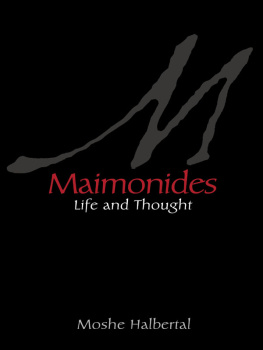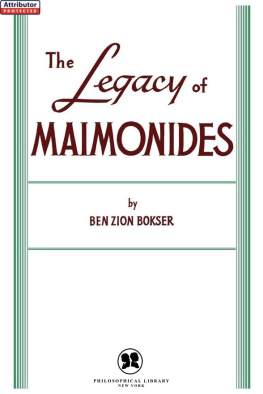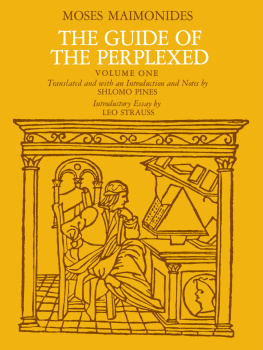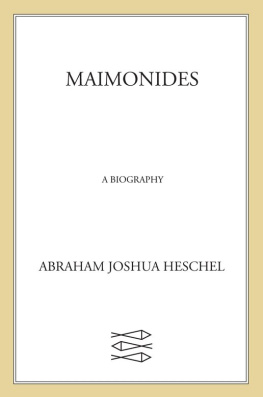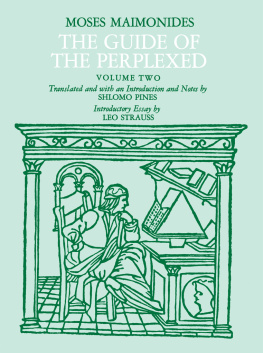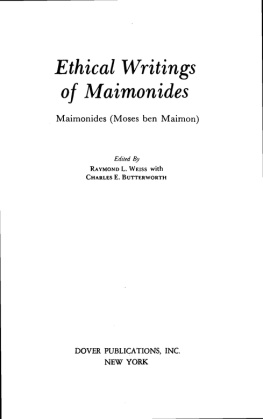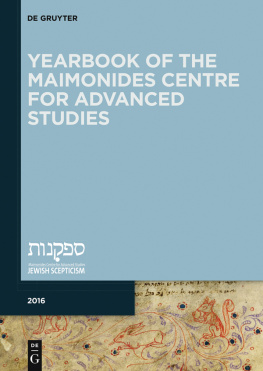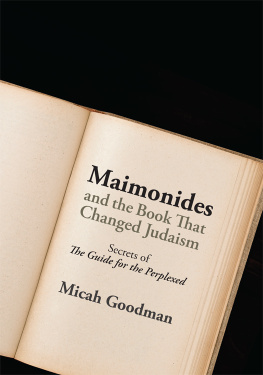Maimonides Moses - Maimonides: life and thought
Here you can read online Maimonides Moses - Maimonides: life and thought full text of the book (entire story) in english for free. Download pdf and epub, get meaning, cover and reviews about this ebook. City: Princeton;NJ u.a, year: 2014;2013, publisher: Princeton University Press, genre: Religion. Description of the work, (preface) as well as reviews are available. Best literature library LitArk.com created for fans of good reading and offers a wide selection of genres:
Romance novel
Science fiction
Adventure
Detective
Science
History
Home and family
Prose
Art
Politics
Computer
Non-fiction
Religion
Business
Children
Humor
Choose a favorite category and find really read worthwhile books. Enjoy immersion in the world of imagination, feel the emotions of the characters or learn something new for yourself, make an fascinating discovery.
- Book:Maimonides: life and thought
- Author:
- Publisher:Princeton University Press
- Genre:
- Year:2014;2013
- City:Princeton;NJ u.a
- Rating:3 / 5
- Favourites:Add to favourites
- Your mark:
- 60
- 1
- 2
- 3
- 4
- 5
Maimonides: life and thought: summary, description and annotation
We offer to read an annotation, description, summary or preface (depends on what the author of the book "Maimonides: life and thought" wrote himself). If you haven't found the necessary information about the book — write in the comments, we will try to find it.
Maimonides: life and thought — read online for free the complete book (whole text) full work
Below is the text of the book, divided by pages. System saving the place of the last page read, allows you to conveniently read the book "Maimonides: life and thought" online for free, without having to search again every time where you left off. Put a bookmark, and you can go to the page where you finished reading at any time.
Font size:
Interval:
Bookmark:

MAIMONIDES
MAIMONIDES Life and Thought
MOSHE HALBERTAL
Translated from the Hebrew by Joel Linsider
Princeton University Press
Princeton and Oxford
First published in Israel under the title ha-Rambam Zalman Shazar Center (Jerusalem), 2009
English translation copyright 2014 by Princeton University Press
Requests for permission to reproduce material from this work
should be sent to Permissions, Princeton University Press
Published by Princeton University Press, 41 William Street,
Princeton, New Jersey 08540
In the United Kingdom: Princeton University Press, 6 Oxford Street, Woodstock,
Oxfordshire OX20 1TW
With thanks to the Center of Jewish Studies at Harvard University for permission to include What Is the Mishneh Torah, previously published in Maimonides After 800 Years. Cambridge: Center for Jewish Studies, 2007.
press.princeton.edu
All Rights Reserved
Library of Congress Cataloging-in-Publication Data
Halbertal, Moshe.
[ha-Rambam. English]
Maimonides : life and thought / Moshe Halbertal ; translated from the Hebrew by Joel Linsider.
pages cm
Includes bibliographical references and index.
ISBN-13: 978-0-691-15851-8 (cloth : alk. paper)
ISBN-10: 0-691-15851-7 (cloth : alk. paper) 1. Maimonides, Moses, 11351204. I. Linsider,
Joel A. II. Title.
B759.M34H3513 2014
296.181dc23
[B]
2013008398
British Library Cataloging-in-Publication Data is available
This book has been composed in Garamond Pro
Printed on acid-free paper.
Printed in the United States of America
10 9 8 7 6 5 4 3 2 1
For Rivkah and Akiva
MAIMONIDES
INTRODUCTION
Moshe ben Maimon (known in Hebrew by the acronym Rambam and in English as Maimonides) attempted to bring about two far-reaching and profound transformations in the Jewish world. The first pertained to the halakhah (Jewish law, broadly construed) which he sought to change, in a fundamental way, from a fragmented and complex system to one that was transparent and unambiguous. In his great code Mishneh Torah, he consolidated the array of halakhic rules and norms and set them in an orderly, unified, and accessible structure. This brilliant work represented a mighty effort to extract the halakhah from the thicket of Talmudic discussions, marked by frequent disagreement and tangled debate. Maimonides set out to create a systematic structure, arranged by subject, from the randomly presented Talmudic material, in which a given issue might be dealt with in various places and diverse contexts. In his Mishneh Torah, Maimonides created an unambiguous, comprehensive, and exhaustive halakhic text; he did so by omitting the halakhic give and take, the disagreements, and the minority opinions that appear in earlier halakhic writings. This transformation of Jewish law was unprecedented in the world of halakhah, as Maimonides himself declared:
I have been preceded by Geonim and great scholars who compiled treatises and issued rulings, in Hebrew and in Arabic, on matters that are known. But not since our holy Rabbi [R. Judah the Prince, the editor of the Mishnah] and his holy associates has anyone resolved halakhic matters regarding the entire Talmud and all the laws of the Torah. (Iggerot, pp. 439440)
In truth, even the Mishnah as edited by R. Judah the Prince at the beginning of the third century is not really a precedent for Mishneh Torah, for it retains unresolved disputes and minority opinions. A code such as Mishneh Torahcomprehensive, exhaustive, accessible, and unambiguoushad never been written before Maimonides time and has not been written since.
The second transformation that Maimonides sought to accomplish was a substantive shift in Jewish religious consciousness. That far-reaching and penetrating transformation, in turn, had three main components.
First, there was the struggle against anthropomorphism, against seeing God as a personality possessed of a body and emotions. Maimonides gave new meaning to the biblical struggle against idolatry. As he saw it, that struggle goes beyond merely shattering the idols found in pagan sanctuaries; it extends to a confrontation with the internalized image of God envisioned by the person worshipping Him. A worshipper who envisions God as a merciful grandfather seated on a throne is worse than one who worships statues. A person worshipping a statue may see the statue as nothing more than a symbolic representation of the exalted God, but a worshipper of God who imagines Him as a human body internalizes the statue and the image into his own consciousness. Maimonides thus turned the biblical iconoclastic fervor toward the shattering of the mental image. Because the tradition itself, both biblical and midrashic, describes God in terms of a human body and attributes to it such emotions as anger, jealousy, love, and mercy, Maimonides is compelled to offer a systematic reinterpretation of Jewish religious language and of religious language in general.
The second, no less radical, element of the transformation in religious consciousness was the placement of the natural and causal order at the center of the divine revelation and presence. Gods wisdom, as revealed in nature, was to be seen as the highest expression of His revelationa position very much at odds with the conventional view that Gods presence in the world was expressed primarily through the extraordinary and the miraculous. This fundamental change in religious sensibility away from miracle and toward causality, or, as Maimonides formulated it, from will to wisdom, required Maimonides to reinterpret some of Judaisms basic concepts, such as providence, creation, prophecy, and revelation, all of them seemingly based on a revelation of divine will and a fracturing of the normal causal order.
Third, the change in religious consciousness entailed ending the distinction between what was within the tradition and what was outside of it. In all his writings, halakhic as well as philosophical, Maimonides saw philosophy and science as the medium for attaining the heights of religious experiencelove and awe of God. In his scientific and philosophical world-view, Maimonides belonged to the school of Aristotle and his Muslim interpreters, al-Farabi, Ibn Bajja, and Ibn Rushd (Averroes). Maimonides accepted the insights offered by these scientific and philosophical streams as substantively true; accordingly, where they conflicted with Jewish tradition, he saw a need to reinterpret the tradition to reconcile it with these truths. But philosophy, in Maimonides world, was more than a critical method of use in drawing conclusions about the world, conclusions to which traditional views had to be conformed. Beyond that, it was considered to be a spiritual discipline and way of life, a stance taken within the world, a system dealing first and foremost with how a persons life should be lived. Through philosophy and science, whose sources of information would appear at first blush to be outside the Jewish tradition, a person can reach the pinnacle of religious life and realize his perfection as a human being. Philosophy does more than criticize; it serves a redemptive purpose as well.
Any one of these three elements of the Maimonidean religious transformation could shake the entire Jewish tradition; occurring all at once, they could be devastating. Accordingly, instilling the new religious sensibility into the heart of Judaism required a new and comprehensive interpretation of the tradition. Moreover, in an effort to ground the basic insights of the religious transformation as binding and authoritative Jewish perspectives, Maimonides integrated them into his code,
Next pageFont size:
Interval:
Bookmark:
Similar books «Maimonides: life and thought»
Look at similar books to Maimonides: life and thought. We have selected literature similar in name and meaning in the hope of providing readers with more options to find new, interesting, not yet read works.
Discussion, reviews of the book Maimonides: life and thought and just readers' own opinions. Leave your comments, write what you think about the work, its meaning or the main characters. Specify what exactly you liked and what you didn't like, and why you think so.

